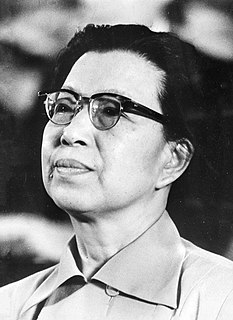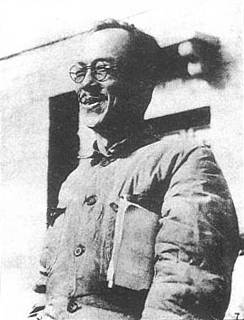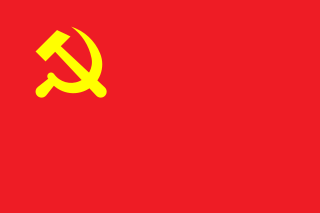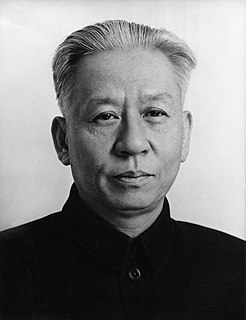Related Research Articles

The Cultural Revolution, formally known as the Great Proletarian Cultural Revolution, was a sociopolitical movement in China from 1966 until Mao Zedong's death in 1976. Launched by Mao, the Chairman of the Chinese Communist Party (CCP) and founder of the People's Republic of China (PRC), its stated goal was to preserve Chinese communism by purging remnants of capitalist and traditional elements from Chinese society, and to re-impose Mao Zedong Thought as the dominant ideology in the PRC. The Revolution marked Mao's return to the central position of power in China after a period of less radical leadership to recover from the failures of the Great Leap Forward, which caused the Great Chinese Famine (1959–61). However, the Revolution failed to achieve its main goals.

The Gang of Four was a Maoist political faction composed of four Chinese Communist Party (CCP) officials. They came to prominence during the Cultural Revolution (1966–1976) and were later charged with a series of treasonous crimes. The gang's leading figure was Jiang Qing. The other members were Zhang Chunqiao, Yao Wenyuan, and Wang Hongwen.

Jiang Qing, also known as Madame Mao, was a Chinese communist revolutionary, actress, and major political figure during the Cultural Revolution (1966–1976). She was the fourth wife of Mao Zedong, the Chairman of the Communist Party and Paramount leader of China. She used the stage name Lan Ping (藍蘋) during her acting career, and was known by many other names. She married Mao in Yan'an in November 1938 and served as the inaugural "First Lady" of the People's Republic of China. Jiang was best known for playing a major role in the Cultural Revolution and for forming the radical political alliance known as the "Gang of Four".

Hua Guofeng, alternatively spelled as Hua Kuo-feng, was a Chinese politician who served as Chairman of the Chinese Communist Party and Premier of the People's Republic of China. The designated successor of Mao Zedong, Hua held the top offices of the government, party, and the military after the deaths of Mao and Premier Zhou Enlai, but was gradually forced out of supreme power by a coalition of party leaders between December 1978 and June 1981, and subsequently retreated from the political limelight, though still remaining a member of the Central Committee until 2002.

The Politburo Standing Committee (PSC), officially the Standing Committee of the Central Political Bureau of the Communist Party of China, is a committee consisting of the top leadership of the Chinese Communist Party (CCP). Historically it has been composed of five to eleven members, and currently has seven members. Its officially mandated purpose is to conduct policy discussions and make decisions on major issues when the Politburo, a larger decision-making body, is not in session. According to the party's Constitution, the General Secretary of the Central Committee must also be a member of the Politburo Standing Committee.

The Central Secretariat of the Chinese Communist Party, officially the Central Secretariat of the Communist Party of China, is a body serving the Politburo of the Chinese Communist Party and its Standing Committee. The secretariat is mainly responsible for carrying out routine operations of the Politburo and the coordination of organizations and stakeholders to achieve tasks as set out by the Politburo. It is empowered by the Politburo to make routine day-to-day decisions on issues of concern in accordance to the decisions of the Politburo, but it must consult the Politburo on substantive matters.

Kang Sheng was a Chinese Communist Party (CCP) official, best known for having overseen the work of the CCP's internal security and intelligence apparatus during the early 1940s and again at the height of the Cultural Revolution in the late 1960s and early 1970s. A member of the CCP from the early 1920s, he spent time in Moscow during the early 1930s, where he learned the methods of the NKVD and became a supporter of Wang Ming for leadership of the CCP. After returning to China in the late 1930s, Kang Sheng switched his allegiance to Mao Zedong and became a close associate of Mao during the Anti-Japanese War, the Chinese Civil War and after. He remained at or near the pinnacle of power in the People's Republic of China from its establishment in 1949 until his death in 1975. After the death of Chairman Mao and the subsequent arrest of the Gang of Four, Kang Sheng was accused of sharing responsibility with the Gang for the excesses of the Cultural Revolution and in 1980 he was expelled posthumously from the CCP.

The Chairman of the Central Committee of the Communist Party of China was the leader of the Communist Party of China. The position was established at the 8th National Congress in 1945 and abolished at the 12th National Congress in 1982, being replaced by the general secretary. Offices with the name Chairman of the Central Executive Committee and Chairman of the Central Committee existed in 1922–1923 and 1928–1931, respectively.

Chen Boda, was a Chinese Communist journalist, professor and political theorist who rose to power as the chief interpreter of Maoism in the first 20 years of the People's Republic of China. Chen became a close associate of Mao Zedong in Yan'an, during the late 1930s, drafting speeches and theoretical essays and directing propaganda.

Red Guards was a mass student-led paramilitary social movement mobilized and guided by Chairman Mao Zedong in 1966 through 1967, during the first phase of the Chinese Cultural Revolution, which he had instituted. According to a Red Guard leader, the movement's aims were as follows:
Chairman Mao has defined our future as an armed revolutionary youth organization.... So if Chairman Mao is our Red-Commander-in-Chief and we are his Red Guards, who can stop us? First we will make China Maoist from inside out and then we will help the working people of other countries make the world red...and then the whole universe.
Big-character posters are handwritten posters with large characters, usually mounted on walls in public spaces such as universities, factories, government departments, and sometimes directly on the streets. They were used as a means of protest, propaganda, and popular communication. A form of popular political writing, big-character posters did not have a fixed format or style, and could appear in the form of letter, slogan, poem, commentary, etc. Though many different political parties around the world have used slogans and posters as propaganda, the most intense, extensive, and varied use of big-character posters was in China in various political campaigns associated with the Chinese Communist Party (CCP). Big-character posters were first used extensively in the Hundred Flowers Campaign, and they played an instrumental role in almost all the subsequent political campaigns, culminating in the Cultural Revolution. Though the right to write big-character posters was deleted from the Constitution of the People's Republic of China in 1980, people still occasionally write big-character posters to express their personal and political opinions.
The (Central) Cultural Revolution Group was formed in May 1966 as a replacement organisation to the Central Committee Secretariat and the "Five Man Group", and was initially directly responsible to the Standing Committee of the Politburo. It consisted mainly of radical supporters of Mao, including Chen Boda, the Chairman's wife Jiang Qing, Kang Sheng, Yao Wenyuan, Zhang Chunqiao, Wang Li and Xie Fuzhi. The CRG played a central role in the Cultural Revolution's first few years, and for a period of time the group replaced the Politburo Standing Committee (PSC) as the de facto top power organ of China. Its members were also involved in many of the major events of the Cultural Revolution.

Wang Dongxing was a Chinese military commander and politician, famous for being the chief of Mao Zedong's personal bodyguard force, the 9th Bureau of the Ministry of Public Security. Wang held many important positions, both in the Chinese Communist Party (CCP) and the government; he was Deputy Minister of Public Security in 1955–1958 and again in 1960–1970 and notably served as CCP Vice Chairman from 1977 to 1980, under Chairman Hua Guofeng.
The 9th Politburo of the Chinese Communist Party was elected at the 1st Plenary Session of the 9th Central Committee on April 28, 1969 and sat in session until August 1973, consisting of 21 members and 4 alternate members. It met for four years, during the middle of the politically insoluble Cultural Revolution. It had been preceded by the 8th Politburo of the Chinese Communist Party.
Wu De, born Li Chunhua (李春华), was a Chinese Communist revolutionary and politician of the People's Republic of China. He served in provincial-level leadership positions in Pingyuan Province, Tianjin municipality, Jilin Province, and Beijing municipality, and was a member of the Politburo of the Chinese Communist Party from 1973 to 1980. After the Cultural Revolution, Wu was a key supporter of Hua Guofeng and was forced out of politics after Deng Xiaoping ousted Hua from his leadership position.
The 3rd Plenary Session of the 11th Central Committee of the Chinese Communist Party was a pivotal meeting of the Central Committee of the Chinese Communist Party held in Beijing, China, from December 18 to December 22, 1978.

Liu Shaoqi was a Chinese revolutionary, politician, and theorist. He was Chairman of the NPC Standing Committee from 1954 to 1959, First Vice Chairman of the Chinese Communist Party from 1956 to 1966 and Chairman of the People's Republic of China, the de jure head of state, from 1959 to 1968, during which he implemented policies of economic reconstruction in China.
Ji Dengkui was a prominent Chinese political figure during the Cultural Revolution. He was a member of the 10th and 11th Politburos of the Communist Party and was a protégé of Mao Zedong in Mao's later years. He served in a number of important government and military posts, including member of the Central Military Commission, Political Commissar of the Beijing Military Region, and Vice Premier of the State Council. After Mao's death in 1976, he supported Mao's designated successor, Hua Guofeng, in purging the Gang of Four. Two years later, Deng Xiaoping ousted Hua from his leadership position, and Ji, labelled the "Little Gang of Four" together with other prominent Hua supporters, was forced out of politics.
The February Countercurrent, also known as the February Adverse Current, refers to the joint efforts by a group of conservative Chinese Communist Party veterans to oppose the ultra-leftist radicalism at the beginning of the Cultural Revolution.
The 10th National Congress of the Chinese Communist Party was a significant Communist Party Congress in China following the fall of Lin Biao and the continuation of the Cultural Revolution. It profoundly elected the 10th Central Committee of the Chinese Communist Party.
References
- MacFarquhar, R and Schoenhals, M; 'Mao's Last Revolution'; Belknap Harvard (2006)